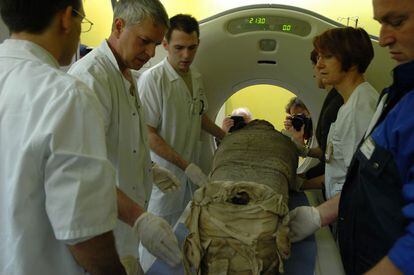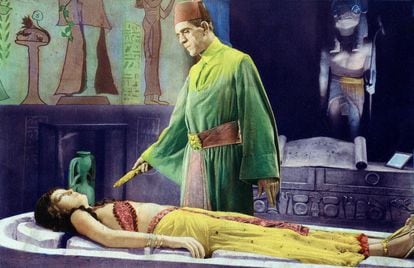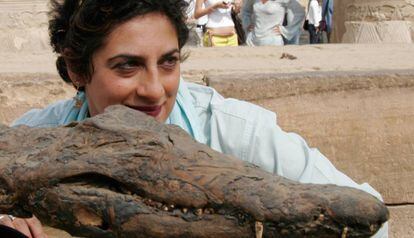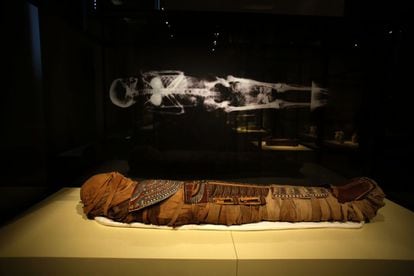The Mummified Remains Return? Why mummies are resisting a name change
An initiative by British museums to use alternative terms for embalmed bodies is considered unnecessary by most Egyptologists consulted by this newspaper

/cloudfront-eu-central-1.images.arcpublishing.com/prisa/UFCJ2J5H5NLRTMQ7QYTBF3K37M.jpg)
Egyptologists opening a sarcophagus at the necropolis of Sakkara, Egypt, in October 2020.KHALED DESOUKI (AFP)
Faced with the impossibility of obtaining their opinion on the matter from Tutankhamun, Ramses II or any other mummified Egyptian (not to mention Boris Karloff), an ad-hoc survey among Egyptologists reveals that an initiative by the British Museum and other UK cultural centers to stop using the word mummy for the embalmed bodies of Ancient Egypt and replacing it with the term "mummified remains" is generally considered unnecessary. The arguments for change are, among others, that the word mummy has colonialist overtones and is often associated with a fictional monster.
"It couldn't be more foolish," says the Egyptologist José Miguel Parra, author of a 2010 book titled Momias (Mummies), a splendid study on the history of mummification in Ancient Egypt that, according to the new guidelines, should be renamed. Taking this logic even further, a movie like The Mummy Returns would become The Mummified Remains Return, which certainly does not have the same ring to it.
"We are dealing with yet another gratuitous gesture by the politically correct movement," says Parra, who has unearthed and studied mummies at the Thebes necropolis as part of the Djehuty Project team in Dra Abu el-Naga (Luxor). "Mummy, a colonialist word?" he scoffs, alluding to one of the arguments used by British museums to stop using the term. "It comes from the Persian mumia, and it was popularized by Pliny the Elder in the first century AD." Parra notes that the word is not derogatory, but simply alludes to the bitumen that the ancients were reminded of when they saw the consistency of the resinous substances with which the bodies were treated during embalming.

This scholar points out that these days, mummies are no longer treated as objects, the way they were during the early days of Egyptology and the popular "unwrapping parties." They are treated with utmost respect, says Parra, and undergo scientific analysis with the latest technology available to modern medicine, which only makes the human condition of these remains all the more explicit. Just as one goes to the doctor to get a CAT scan, so does the mummy. "It seems to me that these days, nobody is questioning the humanity of the mummies. The campaign is easy, but unnecessary, and I don't think it will prosper. The whole issue of dignification seems absurd to me and akin to debating the sex of the angels."
As for the second argument about wanting to separate the mummies from their literary and cinematographic portrayal as supernatural monsters, Parra points out that these depictions are what made mummies popular and got many people interested in Ancient Egypt. Also, let's remember that the mummy is not generally an insensitive monster in these productions, but a being with its own motivations and feelings. We must not forget that the classic mummy of novels and movies was moved by love, like Karloff's character (physically inspired by Ramses III).

Boris Karloff in a scene from the seminal 1932 movie 'The Mummy.'
The Egyptologist Maite Mascort, who has seen many mummies during her digs at Oxyrhynchus, also sees the change in terminology as unnecessary. "Respect does not depend on whether you call mummies one way or another, their dignity is not being questioned by calling them a mummy. There is no need to get into that debate. Mummy is a name that everyone understands and has never had negative connotations when applied to the embalmed bodies of Ancient Egypt. It also helps people to clearly identify specific human remains and arouses their interest. I don't think anyone really thinks that the things in the movies about mummies are true; we just like those stories and they make us interested in the real story."
Like Parra, Mascort stresses that mummies are being treated very fairly right now. "At digs, exhibitions, museums and during research work, respect for mummies as human bodies is currently placed above all else." The Egyptologist considers the use of the word mummy is necessary because it is striking and attractive, and therefore has a positive impact overall.
For Salima Ikram, a leading world expert on mummies who has worked on several field missions and written numerous reference books on the subject, the name change "does not seem necessary to me at all." On the contrary, she says, "I find mummified remains insulting and dehumanizing, and many colleagues share my opinion; remains suggests that the body is fragmented."

For this prestigious Egyptologist from the American University in Cairo, "the problem is the need to educate people so that they understand that a mummy is a human being (or another being in the case of animals) that has gone through a complex transformation process that the ancient Egyptians considered essential to become divine and live forever. I don't think changing the word used to describe that transformed body is going to change attitudes, only education will." Ikram wonders why mummified remains should sound better than mummy. "I am saddened by this simplistic idea that changing the name alters or improves our understanding of the subject; explanations and education are crucial."
Mariàngela Taulé, an Egyptologist and director of the Museu Egipci in Barcelona, a private center, says that the British Museum's initiative sounds a bit far removed from her own center's experience. "We are a modern institution, born 30 years ago, while they have the problems of a museum created in 1753 and containing eight million objects. We have in our rooms a mummy that was anonymous, but we named it the Lady of Kemet to talk about it in a personalized way. We have never viewed mummies in this museum as objects out of touch with what they are: the bodies of human beings. So we don't need that self-critical look that the British Museum has adopted."

The Egyptologist José Manuel Galán, director of the Djehuty Project and currently on a campaign in Luxor, points out that "when the news came out here there was a lot of joking around." He considers that the tendency to be politically correct sometimes goes too far. "Taken to extremes, it is shocking; one would think that if the British have so much awareness about this issue, they might start by returning things to Egypt, but of course, that's not an option." For Galán, the word mummy is not offensive and the whole question is irrelevant. "The important thing is to take good care of human remains, treat them with respect and preserve them. When you overreact, as in this case, you often get the opposite effect: instead of raising awareness, you get wisecracks and memes."
There is one dissenting voice in this debate: the Egyptologist José Ramon Pérez Accino, who is also in Luxor, working on a project involving the Royal Cache. "Besides the fact that the whole thing is a bit of a wank, pardon my French, it cannot be denied that the intention is to humanize the term, and that is not a bad thing. Mummy means little more than bitumen, and embalmed bodies are not bitumen, they are people. In any case, I think it will take a long time for a term other than mummy to catch on, so let's not get our hopes up."
Sign up for our weekly newsletter to get more English-language news coverage from EL PAÍS USA Edition
-- Sent from my Linux system.
No comments:
Post a Comment